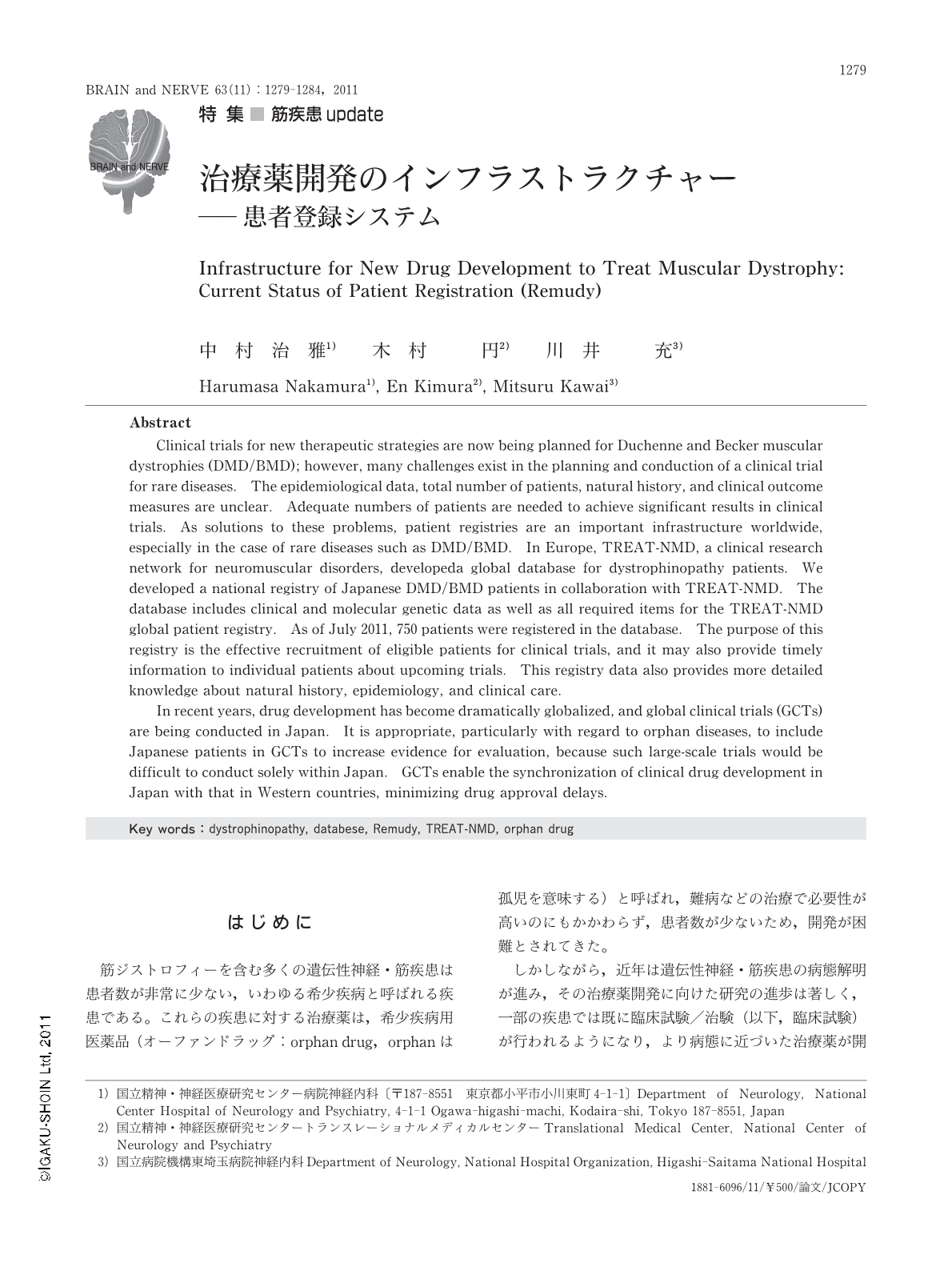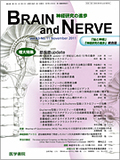Japanese
English
- 有料閲覧
- Abstract 文献概要
- 1ページ目 Look Inside
- 参考文献 Reference
はじめに
筋ジストロフィーを含む多くの遺伝性神経・筋疾患は患者数が非常に少ない,いわゆる希少疾病と呼ばれる疾患である。これらの疾患に対する治療薬は,希少疾病用医薬品(オーファンドラッグ:orphan drug,orphanは孤児を意味する)と呼ばれ,難病などの治療で必要性が高いのにもかかわらず,患者数が少ないため,開発が困難とされてきた。
しかしながら,近年は遺伝性神経・筋疾患の病態解明が進み,その治療薬開発に向けた研究の進歩は著しく,一部の疾患では既に臨床試験/治験(以下,臨床試験)が行われるようになり,より病態に近づいた治療薬が開発される時代が訪れている。
そのうち最も治療薬開発が進んでいる疾患の1つに,Duchenne型筋ジストロフィー(Duchenne muscular dystrophy:DMD)が挙げられる。DMDは,X染色体に存在するジストロフィン遺伝子が欠損しているために発症する遺伝性疾患1)である。筋ジストロフィーの中でも頻度が高い病型であり,出生男児約3,500人につき1人の割合で発症し,日本では約5,000人の患者がいると推測される。運動機能が徐々に低下して,10歳頃に歩行が困難になり,その後呼吸機能低下や心臓機能低下をきたす疾患である。これまで,リハビリテーション,鼻マスクなどによる人工呼吸,心機能低下に対するβ遮断薬やACE(angiotensin converting enzyme)阻害薬,ARB(angiotensin Ⅱ receptor antagonists blocker)による治療,ステロイド治療などにより,運動機能の改善,生命予後の改善がはかられてきたが,これらの多くは対症療法的な治療であった。しかしながら,近年はより病態に近づいた治療薬開発が行われるようになっている。
2011年5月現在,Clinical Trials.govに登録されているDMDに対する薬物による介入試験をみると,38試験が登録されている。そこでは例えば,ジストロフィン遺伝子変異によるジストロフィン欠損を修復することを作用機序とした,エクソンスキッピングやリードスルーなどのさまざまな治療薬が開発されている2)。既に海外においては,アンチセンスオリゴヌクレオチドによるエクソンスキッピングはAVI-4658(PMO)が第1/2相試験を終了3),PRO0514)に関しては,現在第2/3相試験が実施中である5)。リードスルー療法についても,PTC124が臨床試験の後期第2相試験を終了している6)。
これらの臨床試験は,特定の遺伝子変異を持つ患者を対象に開発されている。既に述べたように,多くの遺伝性神経・筋疾患は希少疾患であり,ある特定の遺伝子変異を持つ患者を対象とする場合には,組み入れ基準を満たす患者は極めて少ないと考えられる。臨床試験の計画および実施には,対象患者数の把握や短期間で対象患者をリクルートすることが重要であるが,非常な困難が予想される。
このような状況の中,臨床試験の計画および実施をより円滑に促進するための患者データベースの構築が世界的規模で行われている。患者データベースとは,患者の名前や性別に始まり,自然経過・予後,治療の実態・効果,診療・ケアの実態,遺伝子情報やその表現型の比較など,ある疾患の患者個人の情報を,その目的によって収集・整理・管理した情報の集まり,またそれを管理するシステムのことである。DMDにおいては,ジストロフィンの遺伝子情報を含んだ患者データベースが構築されつつあるのが現状である。
本稿では,世界的な神経・筋疾患の治療法開発に向けた患者登録システムの国内外の動向を,特にTREAT-NMDの活動を中心に述べる。また,日本における筋ジストロフィーナショナルレジストリーであるRemudy(Redystry of Muscular Dystrophy)の構築とその現状,国際共同治験を含めた希少疾患の医薬品開発の動向についても解説する。
Abstract
Clinical trials for new therapeutic strategies are now being planned for Duchenne and Becker muscular dystrophies (DMD/BMD); however, many challenges exist in the planning and conduction of a clinical trial for rare diseases. The epidemiological data, total number of patients, natural history, and clinical outcome measures are unclear. Adequate numbers of patients are needed to achieve significant results in clinical trials. As solutions to these problems, patient registries are an important infrastructure worldwide, especially in the case of rare diseases such as DMD/BMD. In Europe, TREAT-NMD, a clinical research network for neuromuscular disorders, developeda global database for dystrophinopathy patients. We developed a national registry of Japanese DMD/BMD patients in collaboration with TREAT-NMD. The database includes clinical and molecular genetic data as well as all required items for the TREAT-NMD global patient registry. As of July 2011, 750 patients were registered in the database. The purpose of this registry is the effective recruitment of eligible patients for clinical trials, and it may also provide timely information to individual patients about upcoming trials. This registry data also provides more detailed knowledge about natural history, epidemiology, and clinical care.
In recent years,drug development has become dramatically globalized,and global clinical trials (GCTs) are being conducted in Japan. It is appropriate,particularly with regard to orphan diseases,to include Japanese patients in GCTs to increase evidence for evaluation,because such large-scale trials would be difficult to conduct solely within Japan. GCTs enable the synchronization of clinical drug development in Japan with that in Western countries,minimizing drug approval delays.

Copyright © 2011, Igaku-Shoin Ltd. All rights reserved.


